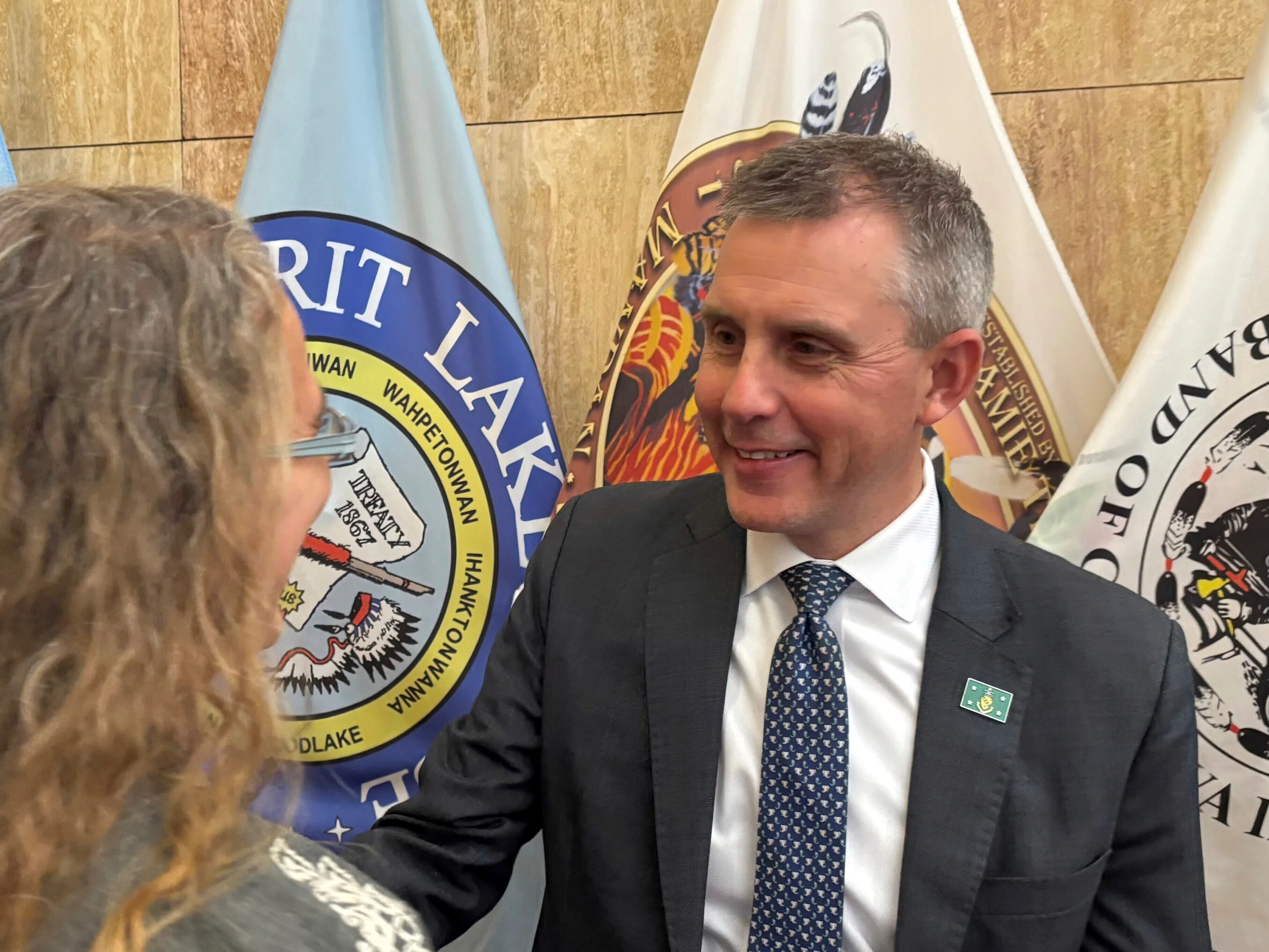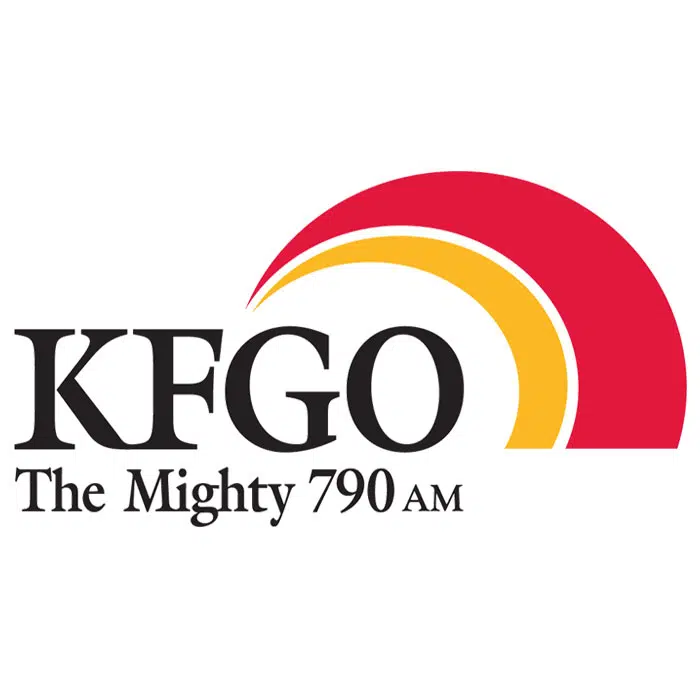
North Dakota Republican Gov. Kelly Armstrong, at right, greets state Rep. Dori Hauck in a receiving line following his State of the State address on Tuesday, Jan. 7, 2025, at the state Capitol in Bismarck, N.D. (AP Photo/Jack Dura)
By: Mary Steurer
BISMARCK, N.D. (North Dakota Monitor) – North Dakota Gov. Kelly Armstrong expressed concerns Monday that a recent Ethics Commission advisory opinion effectively created a new law without input from the Legislature.
The advisory opinion, requested by Sen. Josh Boschee, D-Fargo, and published in June, spoke to whether it is unethical for a public official or someone running for office to use campaign money to pay for child care or security services.
The commission concluded that using campaign money for those purposes is generally permissible if the need for those services was directly caused by the individual’s candidacy or public service.
Armstrong in public testimony pushed back on these findings.
“Paying for day care or security is a policy question, it’s a political question, and it ends up being a legal interpretation of the Century Code,” he said during the hearing. “It should be subject to hearings, should be subject to debate, and it should be subject eventually, to a vote.”
Commissioner Murray Sagsveen during the meeting invited Armstrong to meet with commissioners at a later date to discuss his concerns in more detail.
The commission is permitted to issue advisory opinions under state law, and has done so since 2022.
Armstrong’s remarks about the June advisory opinion came after his public testimony on the Ethics Commission’s proposed travel disclosure rules. It’s unusual for a governor to testify in person at a public hearing for agency rules. Armstrong was one of two people to testify.
The draft rules would require public officials regulated by the Ethics Commission to report certain details to the state any time they go on a trip paid for by a third party in their capacity as a public servant. The official would have to file information about the purpose and dates of the trip, where they went, how much it cost and where the money came from.
The proposed rules also establish a set of penalties for violators, with the fees for late, incorrect or incomplete filings ranging from $25 to $200. The commission would also be able to hand down a fine for someone who fails to report travel details required by other state agencies, like the Office of Management and Budget.
In the most extreme case, the commission could assess a fee of up to $5,000 for an official found to have knowingly failed to report or to have falsified trip details. The commission would also be able to charge for the cost of investigating and collecting such a fee, the draft rules state.
Armstrong said he was generally supportive of the idea of travel disclosure rules, but asked the commission to ensure that anyone fined for violating the rules has the opportunity to appeal.
“There has to be some due process built into it,” he said.
The draft rules were partly based on the statute that establishes late filing fees for campaign disclosures to the North Dakota Secretary of State’s Office. The proposed rules state that the commission may collect fines through its complaint process, a civil action or by sending the fine to a collection agency. Each of those avenues allow the fined individual to respond.
“The commission is open to continued discussions with the governor to ensure due process is satisfied,” Ethics Commission General Counsel Logan Carpenter said in an email.
Armstrong also had questions about how the rules would apply to a public official who traveled for work but then left their position before reporting the required details about their travel.
“People get on and off boards all the time,” Armstrong said. “Where in that process does jurisdiction begin? Where does it end?”
The Attorney General’s Office in a July 10 letter to the commission objected to the proposed rule on the basis that the commission lacks authority to enact penalties. The Attorney General’s Office previously raised this concern in public comments to lawmakers during the 2025 legislative session.
The Attorney General’s Office wrote that if the commission enacts the penalties, the commission would infringe on the powers of the Legislature and executive branch. The Attorney General’s Office also said that any agency that wants to enact a new fee must seek approval from the Legislature, Budget Section or Emergency Commission.
“The Commission would assume the roles of the legislature, investigator, prosecutor, judge, and jury in each of its cases without the separation of powers mandated by the Constitution,” the agency stated in the July letter. It also argued that the $5,000 fine in the draft rules could be “unconstitutionally excessive.”
The commission has said its ability to enforce ethics laws is implicit in the voter-initiated constitutional amendment that created it.
In the public hearing, Rep. Clayton Fegley, R-Berthold, said the system proposed by the draft rule could be burdensome to state lawmakers.
“I’m an EMT, and I get paid $50 for every time I go on an ambulance run,” he said. “Well, that’s travel — am I going to have to file every time I go on an ambulance run?”
As currently written, the proposed rules would only apply to travel that officials the Ethics Commission regulates make in their capacity as public representatives. They wouldn’t require officials to disclose trips that they take as private citizens.
As of Monday, the only other comment on the proposed rules was submitted by a private citizen over email who said the travel rules were necessary to prevent corruption by public officials. The citizen specifically referenced former Sen. Ray Holmberg of Grand Forks, who was sentenced to 10 years in prison earlier this year on child sex tourism charges. At least some of his travels abroad were subsidized with state money.
Comments on the draft rules may be submitted until July 28. To submit a comment, visit the Ethics Commission’s website.




Comments